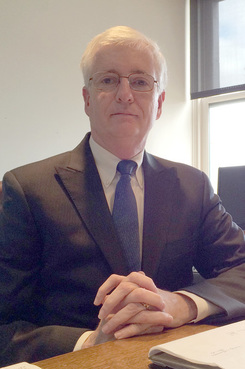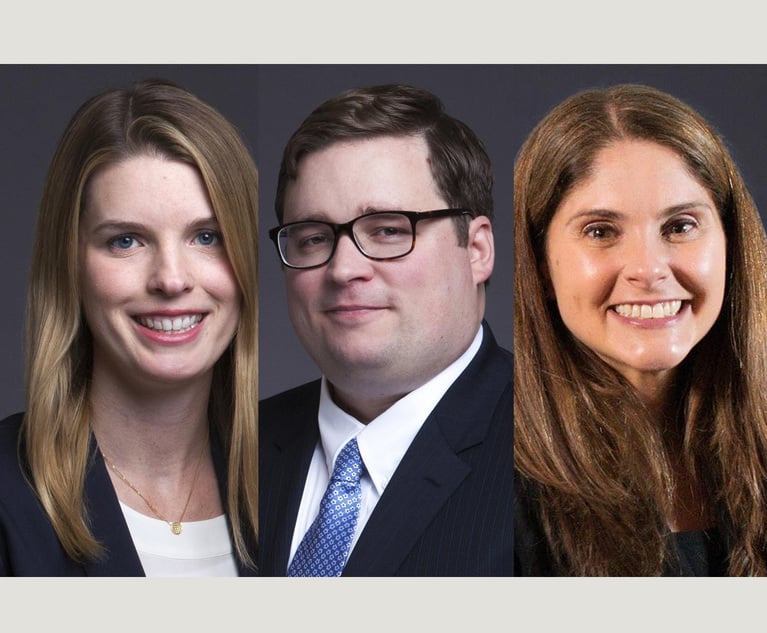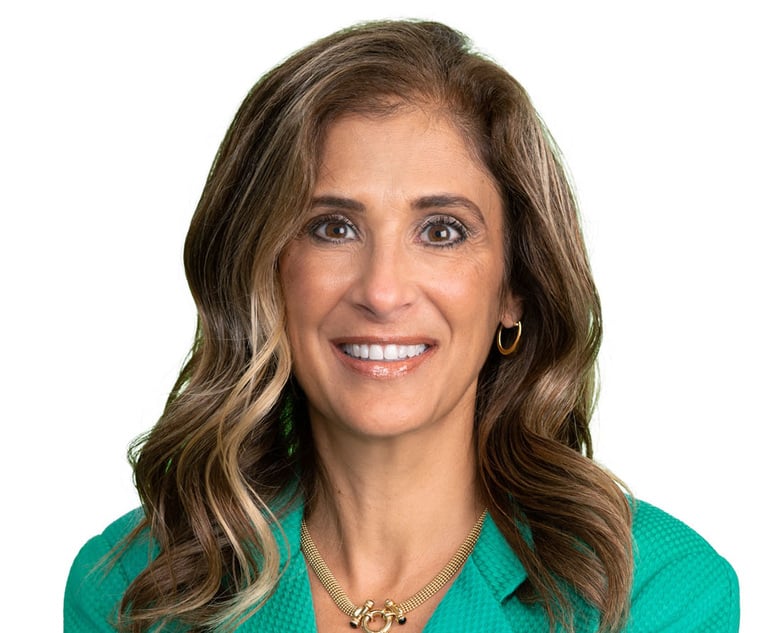First Assistant DA Looks Back on Transitions and a Tumultuous Year
In the 36 years First Assistant District Attorney John Delaney has worked in the Philadelphia DA's Office he has accumulated stories.
October 31, 2017 at 02:53 PM
12 minute read
 ALM
ALM Editor's note: This is part of a series of articles examining the people, departments and practices of the Philadelphia District Attorney's Office.
In the 36 years First Assistant District Attorney John Delaney has worked in the Philadelphia DA's Office he has accumulated stories.
Like the time former Gov. Ed Rendell told him he should work in the juvenile unit because he had seven younger brothers and sisters, or the time that, after appearing on TV following a major win in a grisly case early in his career, his mother called and asked simply, “Do you even own a comb?”
Or, that day in late March when the U.S. Attorney's Office indicted former District Attorney R. Seth Williams on public corruption charges. Williams, who has since pleaded guilty to a bribery charge, was still heading the office at the time.
 John Delaney, first assistant DA, Philadelphia. Photo by Max Mitchell
John Delaney, first assistant DA, Philadelphia. Photo by Max MitchellDelaney said that after learning of the indictment he gathered all the unit and division heads working under him, and told them the message they needed to communicate across the office was that everyone still had important jobs that needed to be done.
“Despite all of the bad things that have happened, the important thing is, just like yesterday and today, that we continue to do our jobs,” he said. “To the people who you serve, to the police and the victims and the witnesses, you're the district attorney. Not Seth Williams.”
And, according to Delaney, that's exactly what happened, as line DAs continued to prosecute cases during that tumultuous time. Three months later, interim District Attorney Kelley Hodge—who Delaney referred to as a “calming influence” for the office—took over.
“Has it made it harder, what he did and the notoriety attached to him? Yes, but it hasn't prevented us from doing our jobs,” he said. “There's an element in this that nobody is above the law. He's the district attorney of Philadelphia. He got caught, and he's paying dearly for it.”
“We've never had a year like this past year, unfortunately,” Delaney said.
Delaney, who took over as second in command at the office earlier this year, has been a prosecutor through five administrations, and has been trying criminal cases since before he was even technically a lawyer.
His history in the office can be traced back to the summer between his second and third year of law school when he interned at the District Attorney's Office during Rendell's time as the city's top prosecutor. As an intern he was allowed to prosecute a handful of cases under the supervision of licensed attorneys in the office.
Delaney said he helped try low-level misdemeanor cases involving charges like drunken driving and simple assault, and was allowed to handle preliminary hearings for more substantial cases, involving auto theft, forgery and burglaries that did not involve someone's home.
He said he never looked back after that experience.
“I went to law school because I wanted to do public service,” he said. “After that internship I knew I wanted to be a prosecutor in Philadelphia.”
Delaney spent most of his early years in the child abuse unit, which has since become a part of the family violence unit. After taking over as Philadelphia's district attorney in 1986, Ronald Castille asked Delaney to become chief of the juvenile unit. In 1990, Delaney took over as deputy of the juvenile division, where he remained until 2002 when then-District Attorney Lynne Abraham asked him to become the deputy of the trial division. In 2010, Delaney spearheaded the new Youth Violence Reduction and Safety program, which enlisted agencies across the city to work together to address criminal justice issues.
In 2012, Delaney again headed the juvenile court unit, and then in 2013 was asked to take over once again as the deputy of the trial division.
“It only took 36 years,” Delaney said. “I've done just about everything, except leave.”
Delaney, who grew up in southwest Philadelphia before graduating from Notre Dame as an undergrad and then Villanova School of Law, said he is primarily motivated and “inspired” by the victims the office represents, particularly the young witnesses often called to testify against individuals who abused them.
“When my law school classmates talk about, 'Jeez, how do you do this? You're dealing with the dregs of society? I say, 'No. I deal with the heroes,'” he said.
Delaney said the office has been in a constant evolution over the past four decades, particularly when it comes to enlisting the help of other city organizations, focused deterrents and its treatment of addiction. Delaney has had a strong role in that evolution, both in his role developing the city's Youth Violence Reduction Partnership, but also his role earlier in his career spearheading the office's truancy program.
However, some programs still in use in the city's criminal justice system, specifically bail reform and civil asset forfeiture, have been increasingly criticized as outdated, unfair and ineffective law enforcement tools.
Conversations about the usefulness of the programs and whether they should be done away with are part of that broader evolution, Delaney said.
“The devil's in the details. If we're going to move away from what we have, what assurances are there that what we're moving to is going to be better? That's a conversation we need to have, but the devil's in the details,” he said. “We've got to continue to improve in a way that minimizes the chances of those things happening, but does that mean we can stop prosecuting people? No it doesn't.”
After 36 years, five administrations and the most tumultuous year in nearly four decades under his belt, Delaney is facing one more looming transition—in November, Philadelphians will be selecting their next district attorney.
Many have said they expect Larry Krasner, the Democratic candidate and frontrunner in the race who has spent years as a civil rights attorney but never worked as a prosecutor, would significantly change the office if elected.
Delaney did not say what a win for Krasner, or Krasner's opponent, Republican candidate Beth Grossman, would mean for his tenure in the office. But he said he expects that whoever wins the general election will evaluate everyone in the office. Just like what happened during each transition before that.
Max Mitchell can be contacted at 215-557-2354 or [email protected]. Follow him on Twitter @MMitchellTLI.
 ALM
ALM Editor's note: This is part of a series of articles examining the people, departments and practices of the Philadelphia District Attorney's Office.
In the 36 years First Assistant District Attorney John Delaney has worked in the Philadelphia DA's Office he has accumulated stories.
Like the time former Gov. Ed Rendell told him he should work in the juvenile unit because he had seven younger brothers and sisters, or the time that, after appearing on TV following a major win in a grisly case early in his career, his mother called and asked simply, “Do you even own a comb?”
Or, that day in late March when the U.S. Attorney's Office indicted former District Attorney R. Seth Williams on public corruption charges. Williams, who has since pleaded guilty to a bribery charge, was still heading the office at the time.
 John Delaney, first assistant DA, Philadelphia. Photo by Max Mitchell
John Delaney, first assistant DA, Philadelphia. Photo by Max MitchellDelaney said that after learning of the indictment he gathered all the unit and division heads working under him, and told them the message they needed to communicate across the office was that everyone still had important jobs that needed to be done.
“Despite all of the bad things that have happened, the important thing is, just like yesterday and today, that we continue to do our jobs,” he said. “To the people who you serve, to the police and the victims and the witnesses, you're the district attorney. Not Seth Williams.”
And, according to Delaney, that's exactly what happened, as line DAs continued to prosecute cases during that tumultuous time. Three months later, interim District Attorney Kelley Hodge—who Delaney referred to as a “calming influence” for the office—took over.
“Has it made it harder, what he did and the notoriety attached to him? Yes, but it hasn't prevented us from doing our jobs,” he said. “There's an element in this that nobody is above the law. He's the district attorney of Philadelphia. He got caught, and he's paying dearly for it.”
“We've never had a year like this past year, unfortunately,” Delaney said.
Delaney, who took over as second in command at the office earlier this year, has been a prosecutor through five administrations, and has been trying criminal cases since before he was even technically a lawyer.
His history in the office can be traced back to the summer between his second and third year of law school when he interned at the District Attorney's Office during Rendell's time as the city's top prosecutor. As an intern he was allowed to prosecute a handful of cases under the supervision of licensed attorneys in the office.
Delaney said he helped try low-level misdemeanor cases involving charges like drunken driving and simple assault, and was allowed to handle preliminary hearings for more substantial cases, involving auto theft, forgery and burglaries that did not involve someone's home.
He said he never looked back after that experience.
“I went to law school because I wanted to do public service,” he said. “After that internship I knew I wanted to be a prosecutor in Philadelphia.”
Delaney spent most of his early years in the child abuse unit, which has since become a part of the family violence unit. After taking over as Philadelphia's district attorney in 1986, Ronald Castille asked Delaney to become chief of the juvenile unit. In 1990, Delaney took over as deputy of the juvenile division, where he remained until 2002 when then-District Attorney Lynne Abraham asked him to become the deputy of the trial division. In 2010, Delaney spearheaded the new Youth Violence Reduction and Safety program, which enlisted agencies across the city to work together to address criminal justice issues.
In 2012, Delaney again headed the juvenile court unit, and then in 2013 was asked to take over once again as the deputy of the trial division.
“It only took 36 years,” Delaney said. “I've done just about everything, except leave.”
Delaney, who grew up in southwest Philadelphia before graduating from Notre Dame as an undergrad and then Villanova School of Law, said he is primarily motivated and “inspired” by the victims the office represents, particularly the young witnesses often called to testify against individuals who abused them.
“When my law school classmates talk about, 'Jeez, how do you do this? You're dealing with the dregs of society? I say, 'No. I deal with the heroes,'” he said.
Delaney said the office has been in a constant evolution over the past four decades, particularly when it comes to enlisting the help of other city organizations, focused deterrents and its treatment of addiction. Delaney has had a strong role in that evolution, both in his role developing the city's Youth Violence Reduction Partnership, but also his role earlier in his career spearheading the office's truancy program.
However, some programs still in use in the city's criminal justice system, specifically bail reform and civil asset forfeiture, have been increasingly criticized as outdated, unfair and ineffective law enforcement tools.
Conversations about the usefulness of the programs and whether they should be done away with are part of that broader evolution, Delaney said.
“The devil's in the details. If we're going to move away from what we have, what assurances are there that what we're moving to is going to be better? That's a conversation we need to have, but the devil's in the details,” he said. “We've got to continue to improve in a way that minimizes the chances of those things happening, but does that mean we can stop prosecuting people? No it doesn't.”
After 36 years, five administrations and the most tumultuous year in nearly four decades under his belt, Delaney is facing one more looming transition—in November, Philadelphians will be selecting their next district attorney.
Many have said they expect Larry Krasner, the Democratic candidate and frontrunner in the race who has spent years as a civil rights attorney but never worked as a prosecutor, would significantly change the office if elected.
Delaney did not say what a win for Krasner, or Krasner's opponent, Republican candidate Beth Grossman, would mean for his tenure in the office. But he said he expects that whoever wins the general election will evaluate everyone in the office. Just like what happened during each transition before that.
Max Mitchell can be contacted at 215-557-2354 or [email protected]. Follow him on Twitter @MMitchellTLI.
This content has been archived. It is available through our partners, LexisNexis® and Bloomberg Law.
To view this content, please continue to their sites.
Not a Lexis Subscriber?
Subscribe Now
Not a Bloomberg Law Subscriber?
Subscribe Now
NOT FOR REPRINT
© 2025 ALM Global, LLC, All Rights Reserved. Request academic re-use from www.copyright.com. All other uses, submit a request to [email protected]. For more information visit Asset & Logo Licensing.
You Might Like
View All
Lawsuit Against Major Food Brands Could Be Sign of Emerging Litigation Over Processed Foods
3 minute read

People in the News—Jan. 23, 2025—Marshall Dennehey, Duane Morris, Hangley Aronchick
3 minute read
Plaintiff Argues Jury's $22M Punitive Damages Finding Undermines J&J's Talc Trial Win
4 minute readTrending Stories
- 1New York-Based Skadden Team Joins White & Case Group in Mexico City for Citigroup Demerger
- 2No Two Wildfires Alike: Lawyers Take Different Legal Strategies in California
- 3Poop-Themed Dog Toy OK as Parody, but Still Tarnished Jack Daniel’s Brand, Court Says
- 4Meet the New President of NY's Association of Trial Court Jurists
- 5Lawyers' Phones Are Ringing: What Should Employers Do If ICE Raids Their Business?
Who Got The Work
J. Brugh Lower of Gibbons has entered an appearance for industrial equipment supplier Devco Corporation in a pending trademark infringement lawsuit. The suit, accusing the defendant of selling knock-off Graco products, was filed Dec. 18 in New Jersey District Court by Rivkin Radler on behalf of Graco Inc. and Graco Minnesota. The case, assigned to U.S. District Judge Zahid N. Quraishi, is 3:24-cv-11294, Graco Inc. et al v. Devco Corporation.
Who Got The Work
Rebecca Maller-Stein and Kent A. Yalowitz of Arnold & Porter Kaye Scholer have entered their appearances for Hanaco Venture Capital and its executives, Lior Prosor and David Frankel, in a pending securities lawsuit. The action, filed on Dec. 24 in New York Southern District Court by Zell, Aron & Co. on behalf of Goldeneye Advisors, accuses the defendants of negligently and fraudulently managing the plaintiff's $1 million investment. The case, assigned to U.S. District Judge Vernon S. Broderick, is 1:24-cv-09918, Goldeneye Advisors, LLC v. Hanaco Venture Capital, Ltd. et al.
Who Got The Work
Attorneys from A&O Shearman has stepped in as defense counsel for Toronto-Dominion Bank and other defendants in a pending securities class action. The suit, filed Dec. 11 in New York Southern District Court by Bleichmar Fonti & Auld, accuses the defendants of concealing the bank's 'pervasive' deficiencies in regards to its compliance with the Bank Secrecy Act and the quality of its anti-money laundering controls. The case, assigned to U.S. District Judge Arun Subramanian, is 1:24-cv-09445, Gonzalez v. The Toronto-Dominion Bank et al.
Who Got The Work
Crown Castle International, a Pennsylvania company providing shared communications infrastructure, has turned to Luke D. Wolf of Gordon Rees Scully Mansukhani to fend off a pending breach-of-contract lawsuit. The court action, filed Nov. 25 in Michigan Eastern District Court by Hooper Hathaway PC on behalf of The Town Residences LLC, accuses Crown Castle of failing to transfer approximately $30,000 in utility payments from T-Mobile in breach of a roof-top lease and assignment agreement. The case, assigned to U.S. District Judge Susan K. Declercq, is 2:24-cv-13131, The Town Residences LLC v. T-Mobile US, Inc. et al.
Who Got The Work
Wilfred P. Coronato and Daniel M. Schwartz of McCarter & English have stepped in as defense counsel to Electrolux Home Products Inc. in a pending product liability lawsuit. The court action, filed Nov. 26 in New York Eastern District Court by Poulos Lopiccolo PC and Nagel Rice LLP on behalf of David Stern, alleges that the defendant's refrigerators’ drawers and shelving repeatedly break and fall apart within months after purchase. The case, assigned to U.S. District Judge Joan M. Azrack, is 2:24-cv-08204, Stern v. Electrolux Home Products, Inc.
Featured Firms
Law Offices of Gary Martin Hays & Associates, P.C.
(470) 294-1674
Law Offices of Mark E. Salomone
(857) 444-6468
Smith & Hassler
(713) 739-1250





